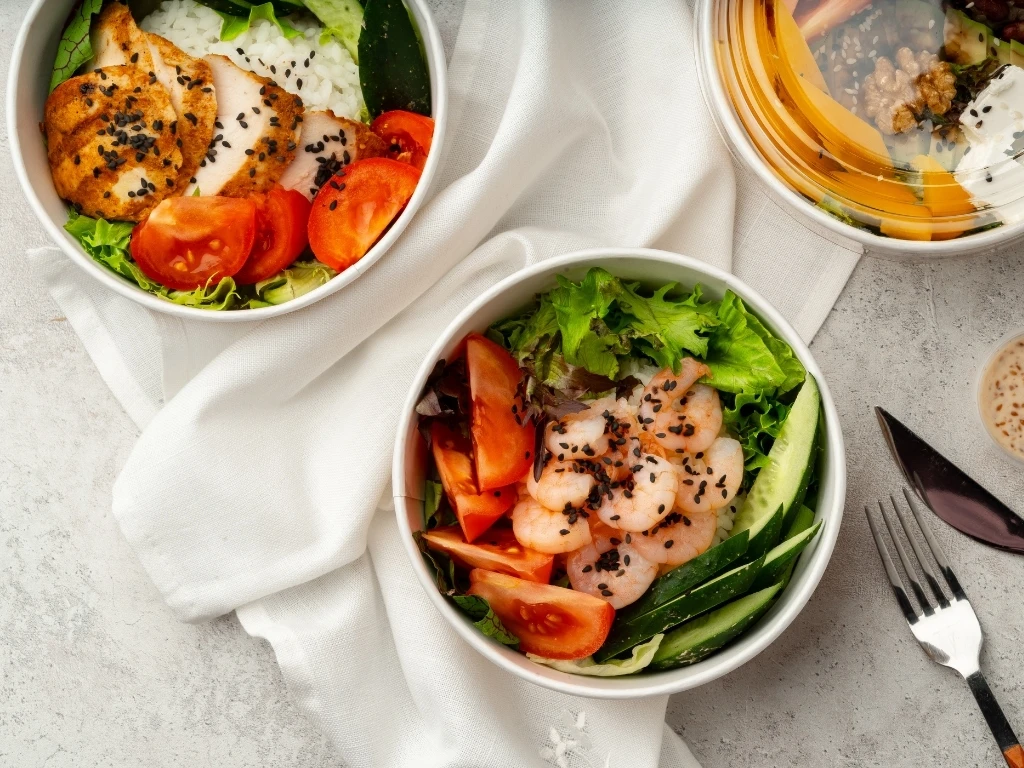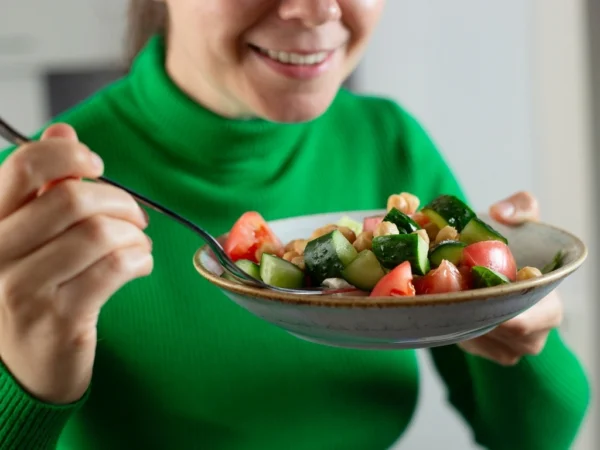Food is one of the most effective tools for managing symptoms of polycystic ovary syndrome (PCOS) and improving hormone balance. While there’s no cure for PCOS, research shows that healthy eating habits can make a significant difference, especially when paired with regular exercise, stress management, quality sleep, and medical care.
Even without a health condition, grocery shopping can feel tricky when you’re unsure which foods truly support your health goals. To help you, we’ve put together a PCOS grocery list to make those trips down the aisles a little easier.

What foods should you eat with PCOS?
A suitable diet for managing PCOS symptoms should have a balanced mix of high fiber, carbohydrates with low glycemic index (GI), lean proteins, and healthy fats. Building your PCOS shopping list around these categories can make everyday choices easier and more intentional.
Colorful produce like leafy greens and cruciferous vegetables can fuel your body with fiber and antioxidants. Beans, lentils, and omega-3-rich fish are also excellent options that provide lasting energy and support insulin sensitivity.
Swapping refined carbs for whole grains can keep your energy steady and your cravings at bay. When you’re looking for a guilt-free treat to satisfy those cravings, some PCOS-friendly snacks to buy include nuts, fruits, and cheeses.
What foods should you avoid with PCOS?

When it comes to dealing with PCOS, you don’t necessarily need to cut out entire food groups; what matters more is learning how to enjoy certain items occasionally and in smaller portions. You’ll gain more benefit from knowing which foods might worsen symptoms when consumed too often, and then use that knowledge as a basis for refining your PCOS grocery list.
Candies, packaged pastries, and sugary drinks like sodas are notorious for spiking blood sugar, primarily due to their high sugar content. These can cause energy crashes and intense cravings later on.
Similarly, refined carbohydrates such as white bread, pizza crust, or regular pasta can make it harder for the body to manage insulin, a function that’s especially important for anyone managing PCOS.
Food items that are high in sodium and unhealthy fats, such as fried foods, chips, deli meats, canned goods, and even butter, margarine, and red meat, tend to worsen symptoms of PCOS and add extra inflammation to the body.
PCOS-friendly foods for your next grocery run
Since different food items can have significant effects on the body, it’s crucial to be intentional with what you put on your plate. That starts with carefully planning your grocery shopping — a simple yet impactful step in managing PCOS.
A grocery plan helps ensure your meals are balanced and nutritious while supporting long-term healthy eating habits. Walking into the store with a clear plan for the week also makes it easier to stick to your goals and avoid impulse buys when cravings hit.
Visualize your cart as the foundation of your week. What you place inside it sets the stage for how you’ll feel, both physically and emotionally. While there’s always room for some of your favorite treats, it helps to actively choose PCOS-safe foods that nourish your body.
As you get ready to stock up your pantry, here’s a quick PCOS grocery list organized into simple categories to make the planning easier:
Fruits
Naturally sweet and high in fiber, fruits can help manage blood sugar levels while providing the essential vitamins and antioxidants that the body requires.
- Blueberries
- Cherries
- Apples
- Oranges
- Pears
- Kiwis
- Papayas
- Melons
- Peaches
- Coconuts
- Grapefruit
- Lemons
Leafy greens
Rich in fiber, vitamins, and minerals, these vegetables can balance hormones while reducing inflammation.
- Romaine lettuce
- Red-leaf lettuce
- Arugula
- Spinach
- Kale
- Cabbage
- Bok choy
- Escarole
- Endive
- Mustard greens
- Swiss chard
- Watercress
Non-starchy and cruciferous vegetables
These vegetables are low in calories and carbohydrates, making them excellent for blood sugar control. Cruciferous types, in particular, contain natural compounds that may help the body process estrogen more effectively.
- Broccoli
- Cauliflower
- Radishes
- Turnips
- Brussels sprouts
- Mushrooms
- Tomatoes
- Green and red peppers
- Zucchini
- Asparagus
- Cucumbers
- Eggplants

Protein (animal or plant-based)
Lean proteins from animal sources support muscle health, improve satiety, and slow the absorption of carbs. Plant-based protein does all of that and additionally provides fiber and gut-friendly nutrients that promote hormone balance and blood sugar stability.
- Chicken
- Turkey
- Eggs
- Salmon
- Tuna
- Tofu
- Edamame
- Lean beef or pork
- Lentils
- Chickpeas
- Black beans
- Kidney beans
Whole grains and low-GI carbs
These complex carbs digest more slowly, helping keep blood sugar stable and lessening cravings.
- Quinoa
- Oats
- Barley
- Brown rice
- Sweet potatoes
- Whole-grain pastas
- Whole wheat breads
- Corn
- Winter squash
- Taro roots
- Buckwheat
- Yams
Healthy fats
These food items not only help reduce inflammation and improve blood sugar, but they also bring other benefits like heart health, brain function, and nutrient absorption.
- Avocados
- Olive oil
- Corn oil
- Canola oil
- Coconut oil
- Walnuts
- Almonds
- Ground Flaxseed
- Chia seeds
- Pumpkin seeds
- Almond butter
- Peanut butter
Dairy products and alternatives
These foods provide calcium and, in some cases, probiotics, which can support bone strength, gut health, and hormone balance.
- Greek yogurt
- Cottage cheese
- Ricotta
- Parmesan
- Goat cheese
- Feta
- Skim or 1% milk
- Soy milk
- Almond milk
- Coconut milk
- Cashew milk
- Oat milk
Stocking your kitchen with a balanced combination of these food items makes meal planning simpler and ensures you always have nourishing options on hand throughout the week.
That said, this PCOS grocery list is meant as general guidance — not a one-size-fits-all solution. Everyone’s body responds differently, and there’s no single formula for PCOS nutrition.
For a more personalized plan, consider working with a registered dietitian who can tailor meals to your unique needs and lifestyle while helping you build sustainable habits.
Tips for smarter grocery shopping with PCOS

Thinking of building your own PCOS grocery list? Here are a few simple strategies to make shopping feel less overwhelming and more empowering:
- Check ingredient labels: Some companies loosely use health-focused buzzwords to make customers believe products have more health benefits than they actually do. Reading the fine print helps you spot added sugars or refined flours so you can stock up on truly PCOS-friendly foods.
- Write it down: Writing down your PCOS grocery list (on paper or in your phone) helps you stay organized, avoid forgetting items, and simplify meal planning. As you create it, include a balance of protein, fiber-rich carbs, and healthy fats for meals that are filling and energizing.
- Think in food groups: Instead of stressing over finding specific items, plan around food categories like fruits, vegetables, proteins, and healthy fats. This makes it easier to swap in whatever’s fresh, affordable, or available that week, unless you’re following a specific recipe.
- Stay flexible: Grocery lists can (and should) evolve. As your symptoms, health goals, and food preferences change, allow your list to evolve with you so it always fits your needs.
Most importantly, remember that consistency matters more than getting it “perfect.” Small, sustainable choices add up to powerful, long-term results for managing PCOS.

Building better eating habits with professional guidance
A well-balanced PCOS grocery list is a great place to start, but to manage your PCOS symptoms long-term, you need more than simply knowing what foods to eat and what to avoid.
Working with a registered dietitian who specializes in PCOS to help you make mindful health choices much more consistently and ensure that they’re always aligned with your health history, goals, and lifestyle.
By signing up for Health Loft, you can meet with dietitians through convenient telehealth sessions, giving you not only personalized grocery lists and meal plans but also proven strategies to help you achieve better hormone balance and symptom relief, no matter where you are.
Our medical experts are also in-network with many providers, which means you could pay as little as $0 depending on your insurance coverage.
Start building sustainable habits that move you closer to better health. Discover how Health Loft dietitians can help achieve better nutrition with PCOS.
This article was reviewed by Adrienne DePaul, MS, RDN. It is intended for informational purposes only and does not replace personalized nutritional advice.













